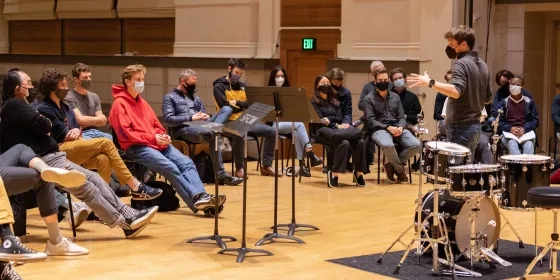Bach: The Jazz Boss You Never Knew?
Classical and jazz joined forces in the pair's first-ever shared masterclass at SFCM with nearly all percussion faculty.
By Mark Taylor
Johann Sebastian Bach is known for many things, his orchestral music, instrumental works, and famous compositions, but what he may not be known for, is his relation to jazz music. The link between the famed German composer of the classical world and jazz music was the topic of conversation at the first-ever shared masterclass between classical and Roots, Jazz, and American Music (RJAM) faculty at SFCM.
“Bach is the original jazz boss,” said Ed Stephan, co-chair of SFCM’s Percussion department and Principal Timpanist of the San Francisco Symphony, who helped run the masterclass in late January, “Not just because of how he wrote, but because of how his music was treated and how he treated it,” Stephan continued, “There was a ton of attitude of improvisation about his music.” America’s one true art form of jazz is known for its improvisation, and in his time, Bach was deemed a monstrous improviser.
The idea of combining the two music genres into a shared class came from Chair of the Percussion Department Jake Nissly, who reached out to RJAM faculty, “We wanted to open the door to cross faculty instruction in the future. I have had the great opportunity to work with the RJAM students since the first year and continue to look forward to those students,” Nissly said of the venture. Nissly is also the current Principal Percussionist of the San Francisco Symphony, but studied jazz in his undergrad years with a double major in Jazz Studies and Classical Percussion Performance. “To me, the two idioms feed one another, especially in the percussion world, though I would argue all instruments can benefit,” Nissly continued, “Cross training or exercising different parts of your brain can enhance the other.”
In addition to Nissly and Stephan, faculty musicians included Matt Wilson, Akira Tana, Jack Van Geem, and Amelie-Anna Hinman as well as their students. During the class faculty shared their journey in music, then dove into a Bach piece performed by a classical student on marimba, with jazz students invited to grab brushes and a snare to jump in and relate it to a traditional jazz pattern, “Instantly, the connection between the two traditions became clear, the most fundamental aspects of any musical genre deeply resonate with our humanity,” said Amelie-Anna Hinman, the assistant director of the RJAM program. “No genre within the art form of music is unrelated or dissimilar from another,” Hinman added.
Bridging the two worlds of classical and jazz can lead to positive effects across both genres, both in the skill of the musician, and the sound of a symphony performance, “We spend 90% of our lives trying not to make mistakes, and I really feel like my work over here, with drum corps, with learning by ear, all these other aspects, really helps positively influence my playing at the symphony,” Nissly said.
Classical and jazz music may not share the same stage often, but faculty at SFCM plan to hold this class again in the future. While Bach may never be widely recognized as an early jazz improviser, faculty hope students learn that not every genre really beats to the sound of its own drum. For teacher and musician Amelia-Anna Hinman, this collaboration was the heart of the class, “My favorite moment was to see students be excited about each other's performances, ideas and questions. That sense of comradery is what being a human being is all about for me.”
Learn more about studying percussion or RJAM at SFCM.
